Brexit: Negotiation Strategies, Pandemic Impact, and Recommendations
VerifiedAdded on 2023/01/06
|12
|2561
|43
Report
AI Summary
This report provides an in-depth analysis of the Brexit negotiations between the United Kingdom and the European Union. It begins by outlining the forces leading up to the 2016 referendum, including socio-economic factors and the UK's motivations for leaving the EU to establish an independent trade policy. The report examines the factors that delayed successful negotiations, such as differing priorities and the impact of the COVID-19 pandemic. It delves into the changing priorities of both the UK and the EU due to the pandemic, which led to shifts in negotiation schedules. Finally, the report offers strategic recommendations for upcoming negotiations, considering the uncertainty surrounding the pandemic, suggesting online meetings and waiting for the situation to normalize before resuming discussions, while emphasizing the importance of effective strategies and potential solutions such as a prospective vaccine and budget extensions.
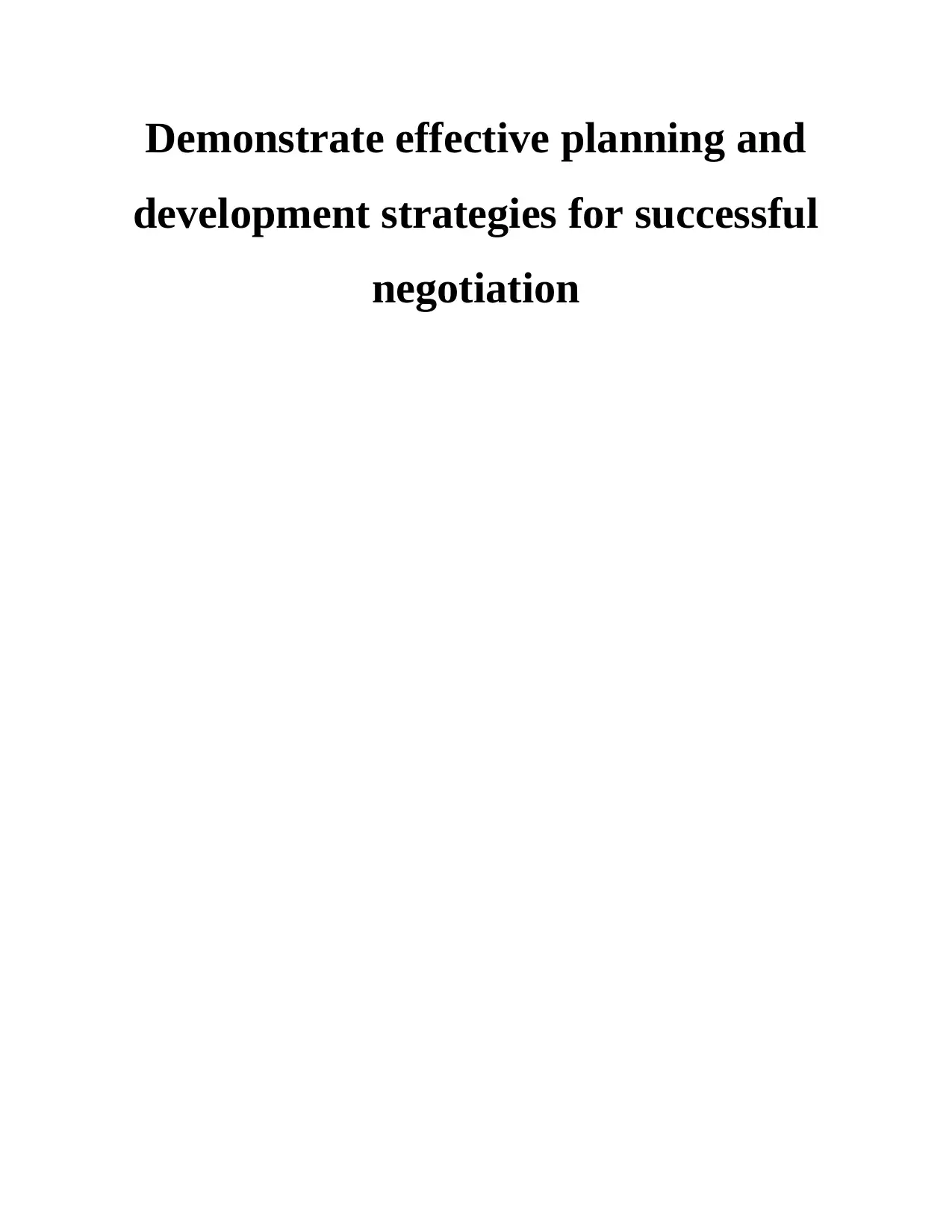
Demonstrate effective planning and
development strategies for successful
negotiation
development strategies for successful
negotiation
Paraphrase This Document
Need a fresh take? Get an instant paraphrase of this document with our AI Paraphraser

Executive summary
This study shows some reasons of negotiation process and bargaining power between 2
parties as it helps both in getting some of their objectives and reaching on final agreement. It also
shows and discusses some forces and factors which lead up to the Brexit referendum in 2016.
Further, it shows reasons of the UK of leaving the EU and how it can make its local people
beneficial from it.
This study shows some reasons of negotiation process and bargaining power between 2
parties as it helps both in getting some of their objectives and reaching on final agreement. It also
shows and discusses some forces and factors which lead up to the Brexit referendum in 2016.
Further, it shows reasons of the UK of leaving the EU and how it can make its local people
beneficial from it.
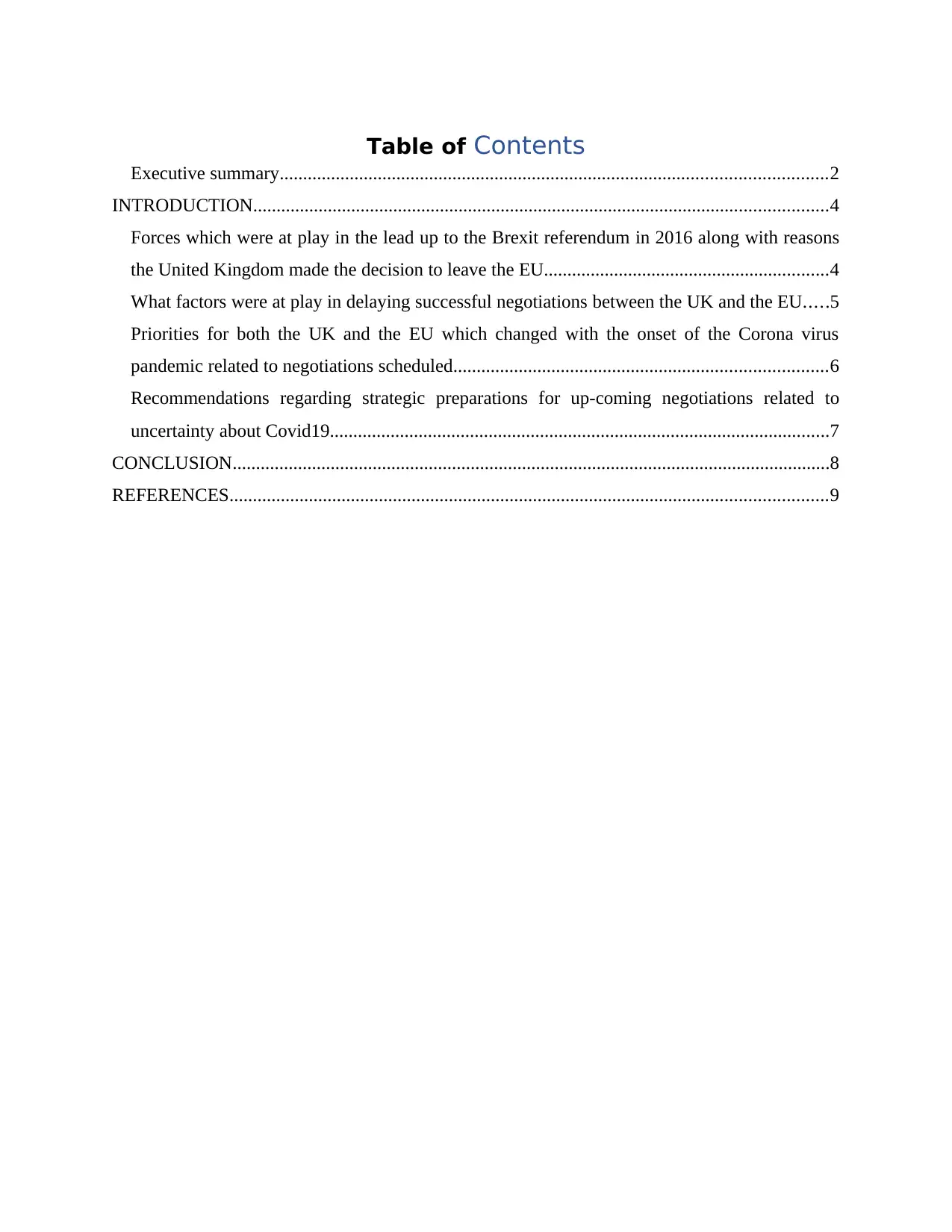
Table of Contents
Executive summary.....................................................................................................................2
INTRODUCTION...........................................................................................................................4
Forces which were at play in the lead up to the Brexit referendum in 2016 along with reasons
the United Kingdom made the decision to leave the EU.............................................................4
What factors were at play in delaying successful negotiations between the UK and the EU.....5
Priorities for both the UK and the EU which changed with the onset of the Corona virus
pandemic related to negotiations scheduled................................................................................6
Recommendations regarding strategic preparations for up-coming negotiations related to
uncertainty about Covid19...........................................................................................................7
CONCLUSION................................................................................................................................8
REFERENCES................................................................................................................................9
Executive summary.....................................................................................................................2
INTRODUCTION...........................................................................................................................4
Forces which were at play in the lead up to the Brexit referendum in 2016 along with reasons
the United Kingdom made the decision to leave the EU.............................................................4
What factors were at play in delaying successful negotiations between the UK and the EU.....5
Priorities for both the UK and the EU which changed with the onset of the Corona virus
pandemic related to negotiations scheduled................................................................................6
Recommendations regarding strategic preparations for up-coming negotiations related to
uncertainty about Covid19...........................................................................................................7
CONCLUSION................................................................................................................................8
REFERENCES................................................................................................................................9
⊘ This is a preview!⊘
Do you want full access?
Subscribe today to unlock all pages.

Trusted by 1+ million students worldwide
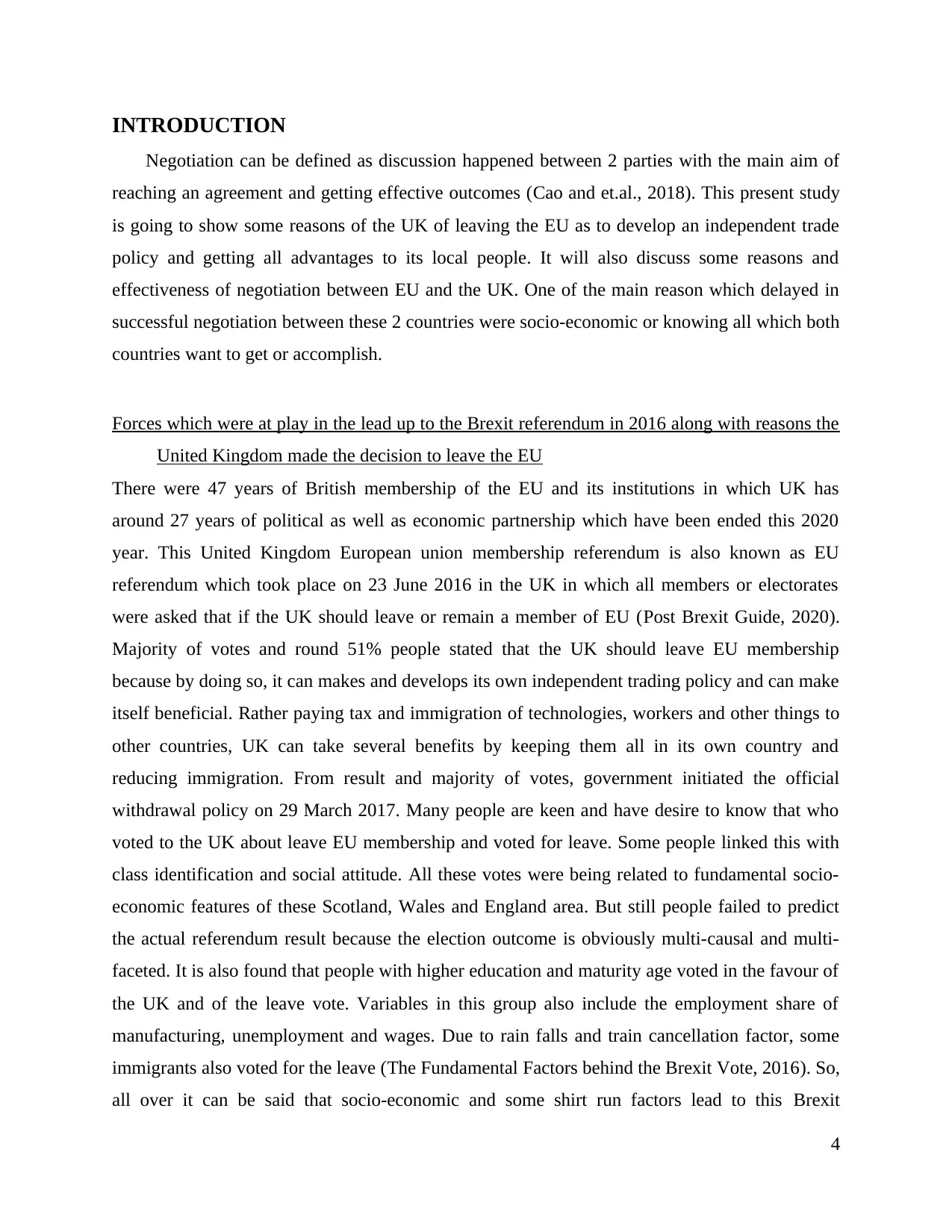
INTRODUCTION
Negotiation can be defined as discussion happened between 2 parties with the main aim of
reaching an agreement and getting effective outcomes (Cao and et.al., 2018). This present study
is going to show some reasons of the UK of leaving the EU as to develop an independent trade
policy and getting all advantages to its local people. It will also discuss some reasons and
effectiveness of negotiation between EU and the UK. One of the main reason which delayed in
successful negotiation between these 2 countries were socio-economic or knowing all which both
countries want to get or accomplish.
Forces which were at play in the lead up to the Brexit referendum in 2016 along with reasons the
United Kingdom made the decision to leave the EU
There were 47 years of British membership of the EU and its institutions in which UK has
around 27 years of political as well as economic partnership which have been ended this 2020
year. This United Kingdom European union membership referendum is also known as EU
referendum which took place on 23 June 2016 in the UK in which all members or electorates
were asked that if the UK should leave or remain a member of EU (Post Brexit Guide, 2020).
Majority of votes and round 51% people stated that the UK should leave EU membership
because by doing so, it can makes and develops its own independent trading policy and can make
itself beneficial. Rather paying tax and immigration of technologies, workers and other things to
other countries, UK can take several benefits by keeping them all in its own country and
reducing immigration. From result and majority of votes, government initiated the official
withdrawal policy on 29 March 2017. Many people are keen and have desire to know that who
voted to the UK about leave EU membership and voted for leave. Some people linked this with
class identification and social attitude. All these votes were being related to fundamental socio-
economic features of these Scotland, Wales and England area. But still people failed to predict
the actual referendum result because the election outcome is obviously multi-causal and multi-
faceted. It is also found that people with higher education and maturity age voted in the favour of
the UK and of the leave vote. Variables in this group also include the employment share of
manufacturing, unemployment and wages. Due to rain falls and train cancellation factor, some
immigrants also voted for the leave (The Fundamental Factors behind the Brexit Vote, 2016). So,
all over it can be said that socio-economic and some shirt run factors lead to this Brexit
4
Negotiation can be defined as discussion happened between 2 parties with the main aim of
reaching an agreement and getting effective outcomes (Cao and et.al., 2018). This present study
is going to show some reasons of the UK of leaving the EU as to develop an independent trade
policy and getting all advantages to its local people. It will also discuss some reasons and
effectiveness of negotiation between EU and the UK. One of the main reason which delayed in
successful negotiation between these 2 countries were socio-economic or knowing all which both
countries want to get or accomplish.
Forces which were at play in the lead up to the Brexit referendum in 2016 along with reasons the
United Kingdom made the decision to leave the EU
There were 47 years of British membership of the EU and its institutions in which UK has
around 27 years of political as well as economic partnership which have been ended this 2020
year. This United Kingdom European union membership referendum is also known as EU
referendum which took place on 23 June 2016 in the UK in which all members or electorates
were asked that if the UK should leave or remain a member of EU (Post Brexit Guide, 2020).
Majority of votes and round 51% people stated that the UK should leave EU membership
because by doing so, it can makes and develops its own independent trading policy and can make
itself beneficial. Rather paying tax and immigration of technologies, workers and other things to
other countries, UK can take several benefits by keeping them all in its own country and
reducing immigration. From result and majority of votes, government initiated the official
withdrawal policy on 29 March 2017. Many people are keen and have desire to know that who
voted to the UK about leave EU membership and voted for leave. Some people linked this with
class identification and social attitude. All these votes were being related to fundamental socio-
economic features of these Scotland, Wales and England area. But still people failed to predict
the actual referendum result because the election outcome is obviously multi-causal and multi-
faceted. It is also found that people with higher education and maturity age voted in the favour of
the UK and of the leave vote. Variables in this group also include the employment share of
manufacturing, unemployment and wages. Due to rain falls and train cancellation factor, some
immigrants also voted for the leave (The Fundamental Factors behind the Brexit Vote, 2016). So,
all over it can be said that socio-economic and some shirt run factors lead to this Brexit
4
Paraphrase This Document
Need a fresh take? Get an instant paraphrase of this document with our AI Paraphraser
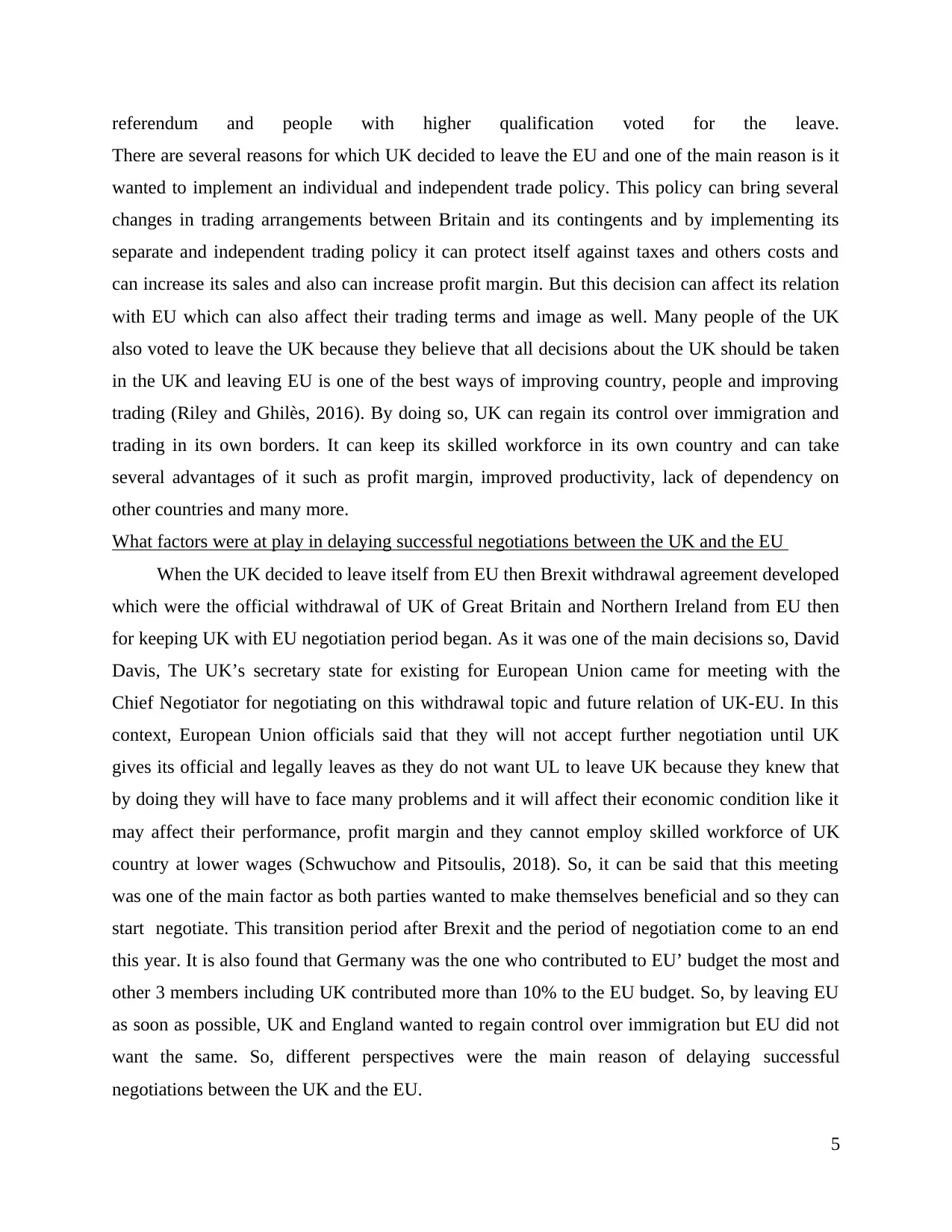
referendum and people with higher qualification voted for the leave.
There are several reasons for which UK decided to leave the EU and one of the main reason is it
wanted to implement an individual and independent trade policy. This policy can bring several
changes in trading arrangements between Britain and its contingents and by implementing its
separate and independent trading policy it can protect itself against taxes and others costs and
can increase its sales and also can increase profit margin. But this decision can affect its relation
with EU which can also affect their trading terms and image as well. Many people of the UK
also voted to leave the UK because they believe that all decisions about the UK should be taken
in the UK and leaving EU is one of the best ways of improving country, people and improving
trading (Riley and Ghilès, 2016). By doing so, UK can regain its control over immigration and
trading in its own borders. It can keep its skilled workforce in its own country and can take
several advantages of it such as profit margin, improved productivity, lack of dependency on
other countries and many more.
What factors were at play in delaying successful negotiations between the UK and the EU
When the UK decided to leave itself from EU then Brexit withdrawal agreement developed
which were the official withdrawal of UK of Great Britain and Northern Ireland from EU then
for keeping UK with EU negotiation period began. As it was one of the main decisions so, David
Davis, The UK’s secretary state for existing for European Union came for meeting with the
Chief Negotiator for negotiating on this withdrawal topic and future relation of UK-EU. In this
context, European Union officials said that they will not accept further negotiation until UK
gives its official and legally leaves as they do not want UL to leave UK because they knew that
by doing they will have to face many problems and it will affect their economic condition like it
may affect their performance, profit margin and they cannot employ skilled workforce of UK
country at lower wages (Schwuchow and Pitsoulis, 2018). So, it can be said that this meeting
was one of the main factor as both parties wanted to make themselves beneficial and so they can
start negotiate. This transition period after Brexit and the period of negotiation come to an end
this year. It is also found that Germany was the one who contributed to EU’ budget the most and
other 3 members including UK contributed more than 10% to the EU budget. So, by leaving EU
as soon as possible, UK and England wanted to regain control over immigration but EU did not
want the same. So, different perspectives were the main reason of delaying successful
negotiations between the UK and the EU.
5
There are several reasons for which UK decided to leave the EU and one of the main reason is it
wanted to implement an individual and independent trade policy. This policy can bring several
changes in trading arrangements between Britain and its contingents and by implementing its
separate and independent trading policy it can protect itself against taxes and others costs and
can increase its sales and also can increase profit margin. But this decision can affect its relation
with EU which can also affect their trading terms and image as well. Many people of the UK
also voted to leave the UK because they believe that all decisions about the UK should be taken
in the UK and leaving EU is one of the best ways of improving country, people and improving
trading (Riley and Ghilès, 2016). By doing so, UK can regain its control over immigration and
trading in its own borders. It can keep its skilled workforce in its own country and can take
several advantages of it such as profit margin, improved productivity, lack of dependency on
other countries and many more.
What factors were at play in delaying successful negotiations between the UK and the EU
When the UK decided to leave itself from EU then Brexit withdrawal agreement developed
which were the official withdrawal of UK of Great Britain and Northern Ireland from EU then
for keeping UK with EU negotiation period began. As it was one of the main decisions so, David
Davis, The UK’s secretary state for existing for European Union came for meeting with the
Chief Negotiator for negotiating on this withdrawal topic and future relation of UK-EU. In this
context, European Union officials said that they will not accept further negotiation until UK
gives its official and legally leaves as they do not want UL to leave UK because they knew that
by doing they will have to face many problems and it will affect their economic condition like it
may affect their performance, profit margin and they cannot employ skilled workforce of UK
country at lower wages (Schwuchow and Pitsoulis, 2018). So, it can be said that this meeting
was one of the main factor as both parties wanted to make themselves beneficial and so they can
start negotiate. This transition period after Brexit and the period of negotiation come to an end
this year. It is also found that Germany was the one who contributed to EU’ budget the most and
other 3 members including UK contributed more than 10% to the EU budget. So, by leaving EU
as soon as possible, UK and England wanted to regain control over immigration but EU did not
want the same. So, different perspectives were the main reason of delaying successful
negotiations between the UK and the EU.
5
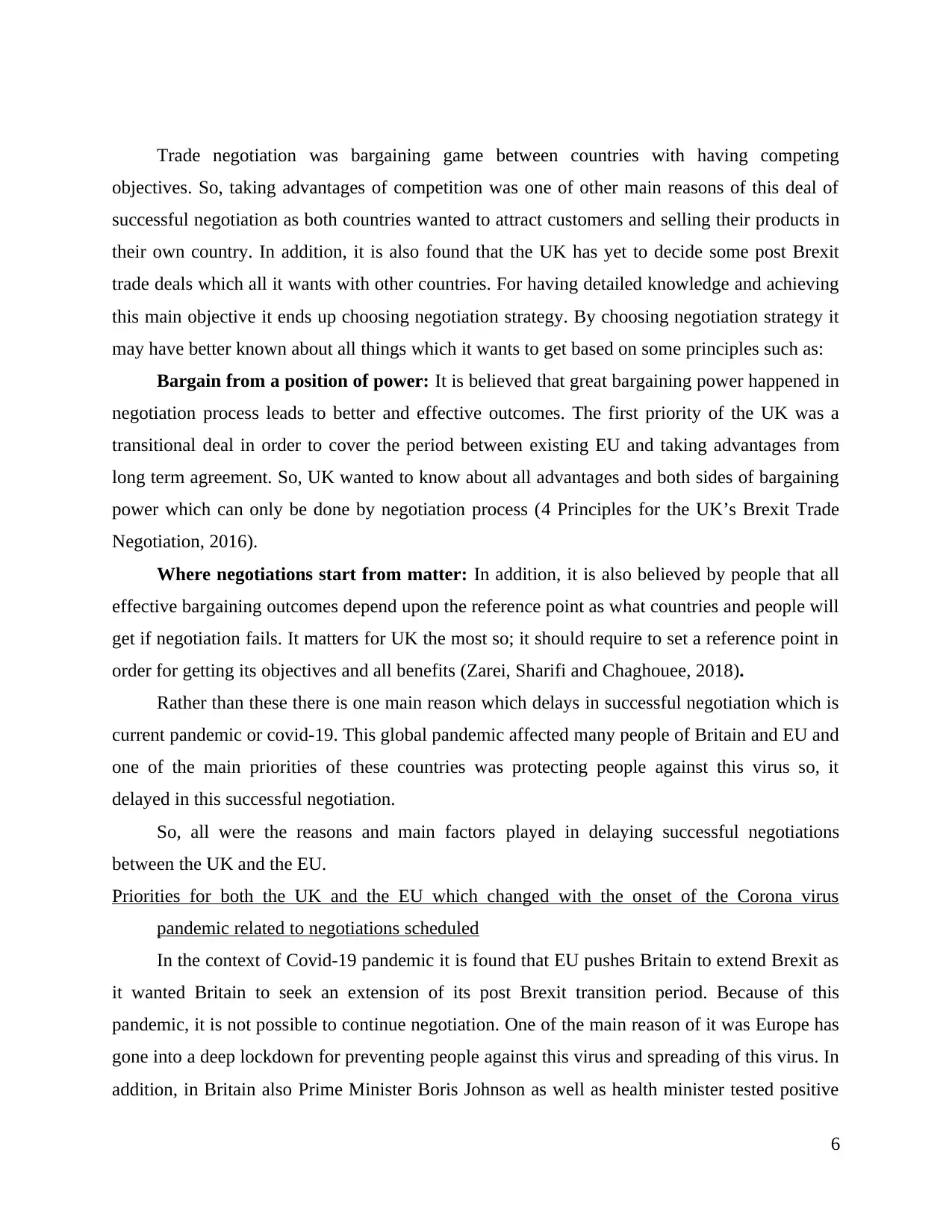
Trade negotiation was bargaining game between countries with having competing
objectives. So, taking advantages of competition was one of other main reasons of this deal of
successful negotiation as both countries wanted to attract customers and selling their products in
their own country. In addition, it is also found that the UK has yet to decide some post Brexit
trade deals which all it wants with other countries. For having detailed knowledge and achieving
this main objective it ends up choosing negotiation strategy. By choosing negotiation strategy it
may have better known about all things which it wants to get based on some principles such as:
Bargain from a position of power: It is believed that great bargaining power happened in
negotiation process leads to better and effective outcomes. The first priority of the UK was a
transitional deal in order to cover the period between existing EU and taking advantages from
long term agreement. So, UK wanted to know about all advantages and both sides of bargaining
power which can only be done by negotiation process (4 Principles for the UK’s Brexit Trade
Negotiation, 2016).
Where negotiations start from matter: In addition, it is also believed by people that all
effective bargaining outcomes depend upon the reference point as what countries and people will
get if negotiation fails. It matters for UK the most so; it should require to set a reference point in
order for getting its objectives and all benefits (Zarei, Sharifi and Chaghouee, 2018).
Rather than these there is one main reason which delays in successful negotiation which is
current pandemic or covid-19. This global pandemic affected many people of Britain and EU and
one of the main priorities of these countries was protecting people against this virus so, it
delayed in this successful negotiation.
So, all were the reasons and main factors played in delaying successful negotiations
between the UK and the EU.
Priorities for both the UK and the EU which changed with the onset of the Corona virus
pandemic related to negotiations scheduled
In the context of Covid-19 pandemic it is found that EU pushes Britain to extend Brexit as
it wanted Britain to seek an extension of its post Brexit transition period. Because of this
pandemic, it is not possible to continue negotiation. One of the main reason of it was Europe has
gone into a deep lockdown for preventing people against this virus and spreading of this virus. In
addition, in Britain also Prime Minister Boris Johnson as well as health minister tested positive
6
objectives. So, taking advantages of competition was one of other main reasons of this deal of
successful negotiation as both countries wanted to attract customers and selling their products in
their own country. In addition, it is also found that the UK has yet to decide some post Brexit
trade deals which all it wants with other countries. For having detailed knowledge and achieving
this main objective it ends up choosing negotiation strategy. By choosing negotiation strategy it
may have better known about all things which it wants to get based on some principles such as:
Bargain from a position of power: It is believed that great bargaining power happened in
negotiation process leads to better and effective outcomes. The first priority of the UK was a
transitional deal in order to cover the period between existing EU and taking advantages from
long term agreement. So, UK wanted to know about all advantages and both sides of bargaining
power which can only be done by negotiation process (4 Principles for the UK’s Brexit Trade
Negotiation, 2016).
Where negotiations start from matter: In addition, it is also believed by people that all
effective bargaining outcomes depend upon the reference point as what countries and people will
get if negotiation fails. It matters for UK the most so; it should require to set a reference point in
order for getting its objectives and all benefits (Zarei, Sharifi and Chaghouee, 2018).
Rather than these there is one main reason which delays in successful negotiation which is
current pandemic or covid-19. This global pandemic affected many people of Britain and EU and
one of the main priorities of these countries was protecting people against this virus so, it
delayed in this successful negotiation.
So, all were the reasons and main factors played in delaying successful negotiations
between the UK and the EU.
Priorities for both the UK and the EU which changed with the onset of the Corona virus
pandemic related to negotiations scheduled
In the context of Covid-19 pandemic it is found that EU pushes Britain to extend Brexit as
it wanted Britain to seek an extension of its post Brexit transition period. Because of this
pandemic, it is not possible to continue negotiation. One of the main reason of it was Europe has
gone into a deep lockdown for preventing people against this virus and spreading of this virus. In
addition, in Britain also Prime Minister Boris Johnson as well as health minister tested positive
6
⊘ This is a preview!⊘
Do you want full access?
Subscribe today to unlock all pages.

Trusted by 1+ million students worldwide
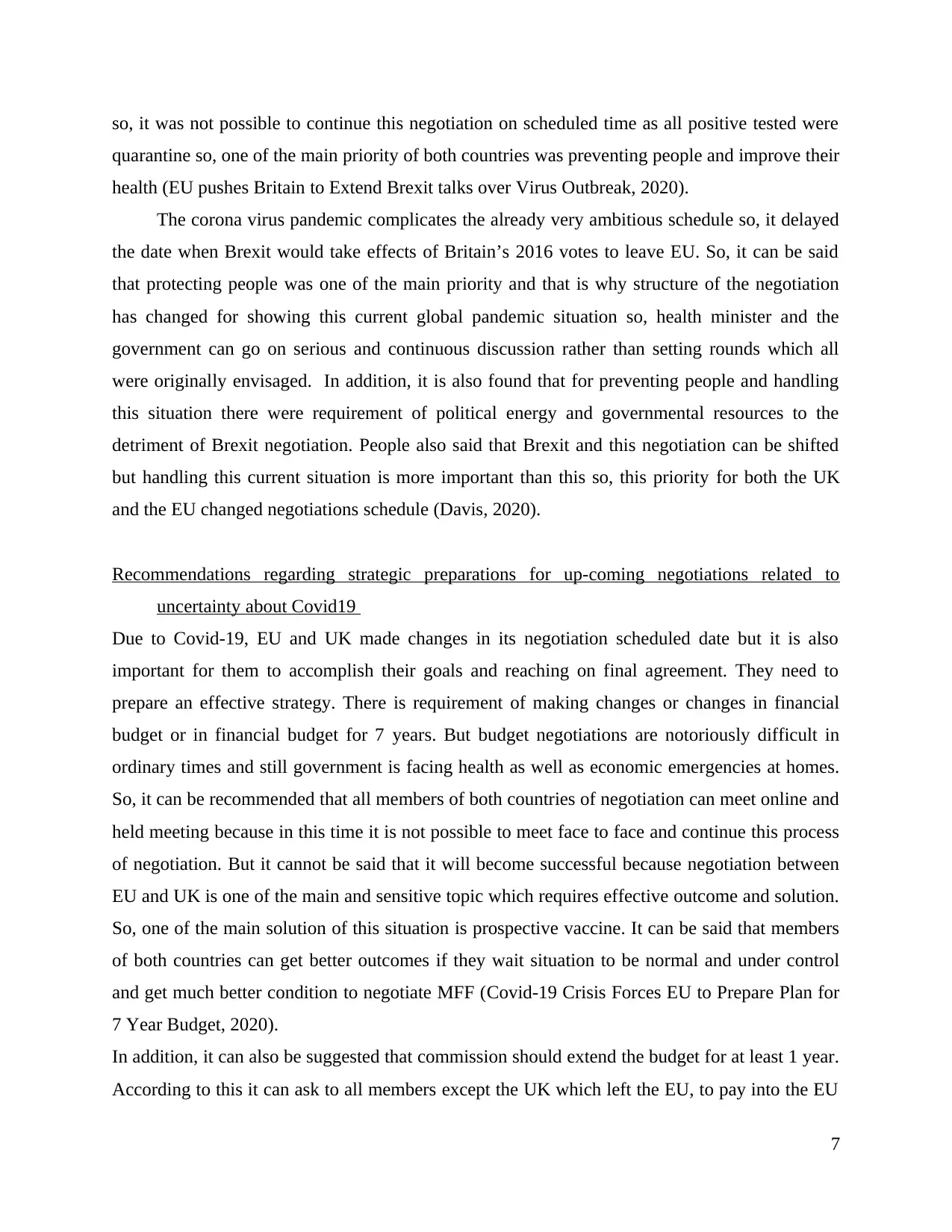
so, it was not possible to continue this negotiation on scheduled time as all positive tested were
quarantine so, one of the main priority of both countries was preventing people and improve their
health (EU pushes Britain to Extend Brexit talks over Virus Outbreak, 2020).
The corona virus pandemic complicates the already very ambitious schedule so, it delayed
the date when Brexit would take effects of Britain’s 2016 votes to leave EU. So, it can be said
that protecting people was one of the main priority and that is why structure of the negotiation
has changed for showing this current global pandemic situation so, health minister and the
government can go on serious and continuous discussion rather than setting rounds which all
were originally envisaged. In addition, it is also found that for preventing people and handling
this situation there were requirement of political energy and governmental resources to the
detriment of Brexit negotiation. People also said that Brexit and this negotiation can be shifted
but handling this current situation is more important than this so, this priority for both the UK
and the EU changed negotiations schedule (Davis, 2020).
Recommendations regarding strategic preparations for up-coming negotiations related to
uncertainty about Covid19
Due to Covid-19, EU and UK made changes in its negotiation scheduled date but it is also
important for them to accomplish their goals and reaching on final agreement. They need to
prepare an effective strategy. There is requirement of making changes or changes in financial
budget or in financial budget for 7 years. But budget negotiations are notoriously difficult in
ordinary times and still government is facing health as well as economic emergencies at homes.
So, it can be recommended that all members of both countries of negotiation can meet online and
held meeting because in this time it is not possible to meet face to face and continue this process
of negotiation. But it cannot be said that it will become successful because negotiation between
EU and UK is one of the main and sensitive topic which requires effective outcome and solution.
So, one of the main solution of this situation is prospective vaccine. It can be said that members
of both countries can get better outcomes if they wait situation to be normal and under control
and get much better condition to negotiate MFF (Covid-19 Crisis Forces EU to Prepare Plan for
7 Year Budget, 2020).
In addition, it can also be suggested that commission should extend the budget for at least 1 year.
According to this it can ask to all members except the UK which left the EU, to pay into the EU
7
quarantine so, one of the main priority of both countries was preventing people and improve their
health (EU pushes Britain to Extend Brexit talks over Virus Outbreak, 2020).
The corona virus pandemic complicates the already very ambitious schedule so, it delayed
the date when Brexit would take effects of Britain’s 2016 votes to leave EU. So, it can be said
that protecting people was one of the main priority and that is why structure of the negotiation
has changed for showing this current global pandemic situation so, health minister and the
government can go on serious and continuous discussion rather than setting rounds which all
were originally envisaged. In addition, it is also found that for preventing people and handling
this situation there were requirement of political energy and governmental resources to the
detriment of Brexit negotiation. People also said that Brexit and this negotiation can be shifted
but handling this current situation is more important than this so, this priority for both the UK
and the EU changed negotiations schedule (Davis, 2020).
Recommendations regarding strategic preparations for up-coming negotiations related to
uncertainty about Covid19
Due to Covid-19, EU and UK made changes in its negotiation scheduled date but it is also
important for them to accomplish their goals and reaching on final agreement. They need to
prepare an effective strategy. There is requirement of making changes or changes in financial
budget or in financial budget for 7 years. But budget negotiations are notoriously difficult in
ordinary times and still government is facing health as well as economic emergencies at homes.
So, it can be recommended that all members of both countries of negotiation can meet online and
held meeting because in this time it is not possible to meet face to face and continue this process
of negotiation. But it cannot be said that it will become successful because negotiation between
EU and UK is one of the main and sensitive topic which requires effective outcome and solution.
So, one of the main solution of this situation is prospective vaccine. It can be said that members
of both countries can get better outcomes if they wait situation to be normal and under control
and get much better condition to negotiate MFF (Covid-19 Crisis Forces EU to Prepare Plan for
7 Year Budget, 2020).
In addition, it can also be suggested that commission should extend the budget for at least 1 year.
According to this it can ask to all members except the UK which left the EU, to pay into the EU
7
Paraphrase This Document
Need a fresh take? Get an instant paraphrase of this document with our AI Paraphraser
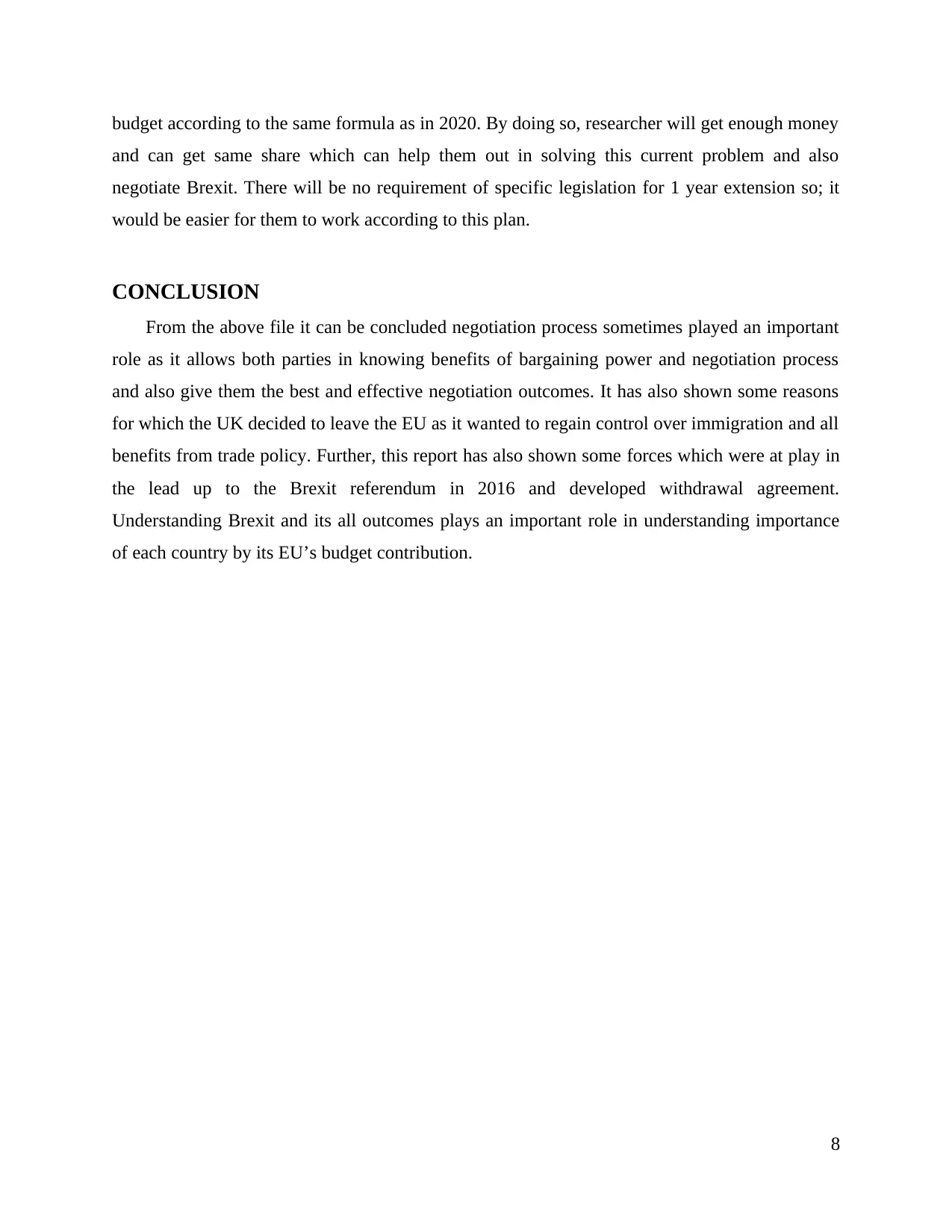
budget according to the same formula as in 2020. By doing so, researcher will get enough money
and can get same share which can help them out in solving this current problem and also
negotiate Brexit. There will be no requirement of specific legislation for 1 year extension so; it
would be easier for them to work according to this plan.
CONCLUSION
From the above file it can be concluded negotiation process sometimes played an important
role as it allows both parties in knowing benefits of bargaining power and negotiation process
and also give them the best and effective negotiation outcomes. It has also shown some reasons
for which the UK decided to leave the EU as it wanted to regain control over immigration and all
benefits from trade policy. Further, this report has also shown some forces which were at play in
the lead up to the Brexit referendum in 2016 and developed withdrawal agreement.
Understanding Brexit and its all outcomes plays an important role in understanding importance
of each country by its EU’s budget contribution.
8
and can get same share which can help them out in solving this current problem and also
negotiate Brexit. There will be no requirement of specific legislation for 1 year extension so; it
would be easier for them to work according to this plan.
CONCLUSION
From the above file it can be concluded negotiation process sometimes played an important
role as it allows both parties in knowing benefits of bargaining power and negotiation process
and also give them the best and effective negotiation outcomes. It has also shown some reasons
for which the UK decided to leave the EU as it wanted to regain control over immigration and all
benefits from trade policy. Further, this report has also shown some forces which were at play in
the lead up to the Brexit referendum in 2016 and developed withdrawal agreement.
Understanding Brexit and its all outcomes plays an important role in understanding importance
of each country by its EU’s budget contribution.
8
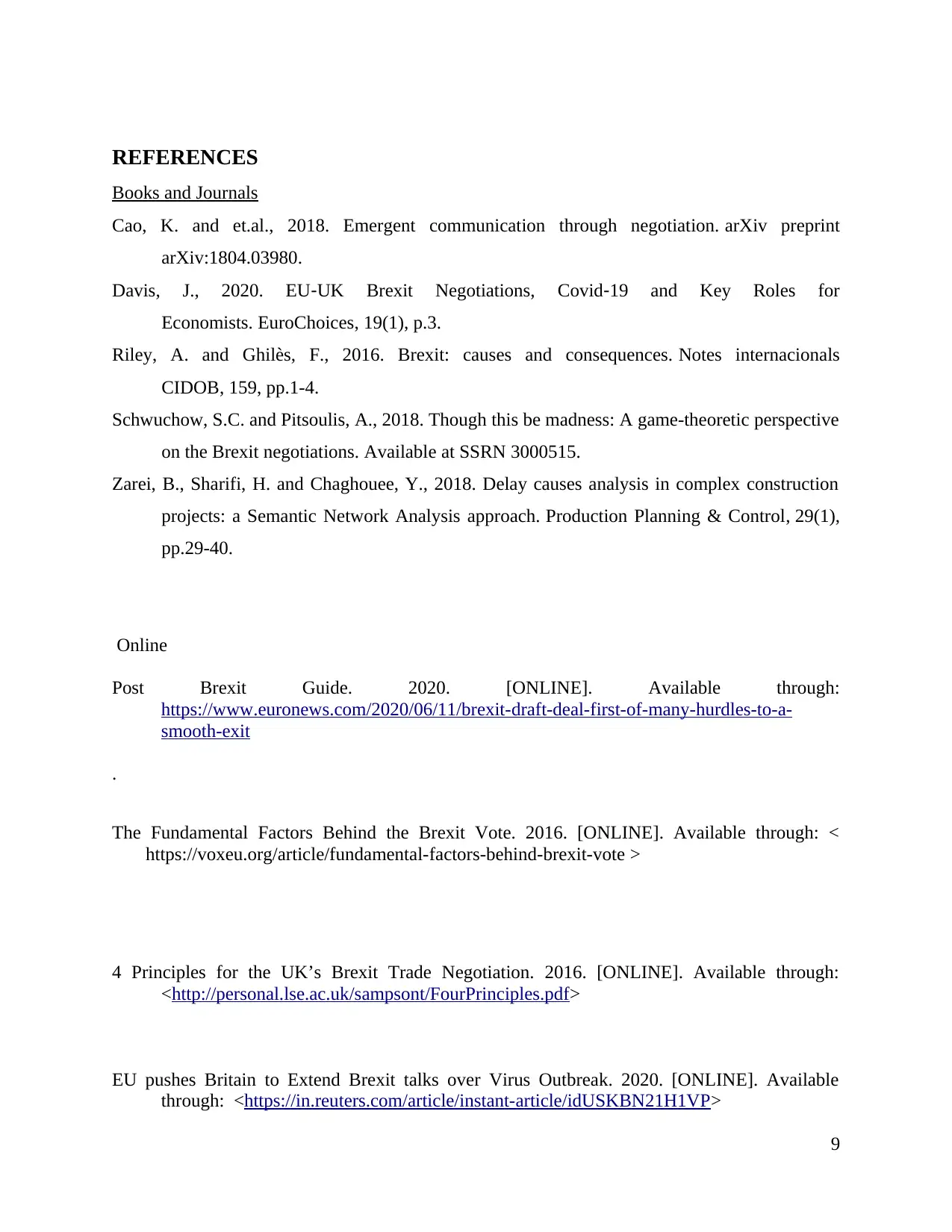
REFERENCES
Books and Journals
Cao, K. and et.al., 2018. Emergent communication through negotiation. arXiv preprint
arXiv:1804.03980.
Davis, J., 2020. EU‐UK Brexit Negotiations, Covid‐19 and Key Roles for
Economists. EuroChoices, 19(1), p.3.
Riley, A. and Ghilès, F., 2016. Brexit: causes and consequences. Notes internacionals
CIDOB, 159, pp.1-4.
Schwuchow, S.C. and Pitsoulis, A., 2018. Though this be madness: A game-theoretic perspective
on the Brexit negotiations. Available at SSRN 3000515.
Zarei, B., Sharifi, H. and Chaghouee, Y., 2018. Delay causes analysis in complex construction
projects: a Semantic Network Analysis approach. Production Planning & Control, 29(1),
pp.29-40.
Online
Post Brexit Guide. 2020. [ONLINE]. Available through:
https://www.euronews.com/2020/06/11/brexit-draft-deal-first-of-many-hurdles-to-a-
smooth-exit
.
The Fundamental Factors Behind the Brexit Vote. 2016. [ONLINE]. Available through: <
https://voxeu.org/article/fundamental-factors-behind-brexit-vote >
4 Principles for the UK’s Brexit Trade Negotiation. 2016. [ONLINE]. Available through:
<http://personal.lse.ac.uk/sampsont/FourPrinciples.pdf>
EU pushes Britain to Extend Brexit talks over Virus Outbreak. 2020. [ONLINE]. Available
through: <https://in.reuters.com/article/instant-article/idUSKBN21H1VP>
9
Books and Journals
Cao, K. and et.al., 2018. Emergent communication through negotiation. arXiv preprint
arXiv:1804.03980.
Davis, J., 2020. EU‐UK Brexit Negotiations, Covid‐19 and Key Roles for
Economists. EuroChoices, 19(1), p.3.
Riley, A. and Ghilès, F., 2016. Brexit: causes and consequences. Notes internacionals
CIDOB, 159, pp.1-4.
Schwuchow, S.C. and Pitsoulis, A., 2018. Though this be madness: A game-theoretic perspective
on the Brexit negotiations. Available at SSRN 3000515.
Zarei, B., Sharifi, H. and Chaghouee, Y., 2018. Delay causes analysis in complex construction
projects: a Semantic Network Analysis approach. Production Planning & Control, 29(1),
pp.29-40.
Online
Post Brexit Guide. 2020. [ONLINE]. Available through:
https://www.euronews.com/2020/06/11/brexit-draft-deal-first-of-many-hurdles-to-a-
smooth-exit
.
The Fundamental Factors Behind the Brexit Vote. 2016. [ONLINE]. Available through: <
https://voxeu.org/article/fundamental-factors-behind-brexit-vote >
4 Principles for the UK’s Brexit Trade Negotiation. 2016. [ONLINE]. Available through:
<http://personal.lse.ac.uk/sampsont/FourPrinciples.pdf>
EU pushes Britain to Extend Brexit talks over Virus Outbreak. 2020. [ONLINE]. Available
through: <https://in.reuters.com/article/instant-article/idUSKBN21H1VP>
9
⊘ This is a preview!⊘
Do you want full access?
Subscribe today to unlock all pages.

Trusted by 1+ million students worldwide

Covid-19 Crisis Forces EU to Prepare Plan for 7 Year Budget. 2020. [ONLINE]. Available
through: < https://sciencebusiness.net/covid-19/news/covid-19-crisis-forces-eu-prepare-
plan-b-and-plan-c-seven-year-budget>
10
through: < https://sciencebusiness.net/covid-19/news/covid-19-crisis-forces-eu-prepare-
plan-b-and-plan-c-seven-year-budget>
10
Paraphrase This Document
Need a fresh take? Get an instant paraphrase of this document with our AI Paraphraser

11

12
⊘ This is a preview!⊘
Do you want full access?
Subscribe today to unlock all pages.

Trusted by 1+ million students worldwide
1 out of 12
Related Documents
Your All-in-One AI-Powered Toolkit for Academic Success.
+13062052269
info@desklib.com
Available 24*7 on WhatsApp / Email
![[object Object]](/_next/static/media/star-bottom.7253800d.svg)
Unlock your academic potential
Copyright © 2020–2026 A2Z Services. All Rights Reserved. Developed and managed by ZUCOL.





